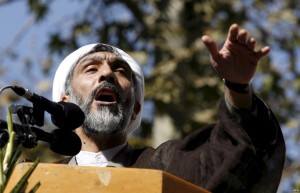Iran’s Justice Minister Says Detained Opposition Leaders Should Receive No Trial
In statements during a speech in the city of Mashhad, Iran’s Justice Minister Mostafa Pour-Mohammadi said yesterday that a trial for imprisoned 2009 presidential candidates Mir Hossein Mousavi and Mehdi Karroubi would not be in the best interest of the regime, and that the regime has determined that “they should remain restricted.” Pour-Mohammadi added that if Mousavi and Karroubi were put on trial, the Iranian regime “would witness struggles, confrontations, and demonstrations.”
“It wasn’t in the country’s best interest to enforce these individuals’ punishment, because it could have led to imprisonment or murders, as well as fresh demonstrations and struggles,” he told ISNA, without clarifying the exact charges, the trial, or where and when the “punishment” for Mir Hossein Mousavi and Mehdi Karroubi had been determined. The statements are especially troubling to Iran observers since they come from the Rouhani administration’s liaison with the Iranian Judiciary.
During the more than 1,100 days since the house arrests of the reformist leaders in Iran, the international community and human rights organizations have repeatedly expressed their concern about Mir Hossein Mousavi’s, his wife Zahra Rahnavard’s, and Mehdi Karroubi’s loss of basic human rights, the absence of clear charges against them, and their lack of access to due process. Iranian Police Commander Esmaeel Ahmadi Moghaddam said in December 2012 that Iran’s Supreme Leader Ali Khamenei was directly responsible for the house arrest of the opposition leaders. However, other Iranian officials, including Mr. Pour-Mohammadi himself, have said that Iran’s Supreme National Security Council makes direct decisions about continuing the house arrests or any changes in the current situation.
The International Campaign for Human Rights in Iran has repeatedly asked the Iranian authorities for the unconditional release of the three political dissidents under extra-judicial house arrest. The continued house arrest of the opposition leaders is a clear example of the influence of intelligence and security organizations, as well as Iran’s Supreme Leader, on Iran’s judicial processes, and the violation of human rights for political reasons.
Mostafa Pour-Mohammadi, who is one of the individuals implicated in the mass executions of political dissidents inside Iranian prisons in the 1980s, was one of the most controversial candidates in Hassan Rouhani’s proposed cabinet last summer. Many critics of his appointment believed that his choice and his appointment to the Ministry of Justice would see an end to any hopes for improvement of the human rights situation in Iran. Pour-Mohammadi’s statements, unfortunately, confirm that bleak view.
When asked about the reports prepared by Ahmed Shaheed, the UN Special Rapporteur for Human Rights in Iran, Pour-Mohammadi called him “corrupt” and “a political worker,” and “not a legal expert.” “Ahmed Shaheed did not begin his work in this regard as a legal expert, but as a political worker, and from the first day of his activities, he started issuing false statements. Our request is that in order to evaluate the human rights situation in Iran, an individual without dependence and political positioning be active in this area, and we do not consider Ahmed Shaheed an objective reporter in this area,” said Pour-Mohammadi. The Iranian government has refused to allow Ahmed Shaheed to visit Iran to carry out his UN mandate.
Pour-Mohammadi’s new interest in human rights appears to be a part of the Iranian officials’ new offensive against the UN and the international community for their continued and repeated criticism of the Islamic Republic of Iran’s deteriorating situation of human rights. Iran’s paramilitary Basij Organization, a subsidiary of the IRGC, announced yesterday that in order to confront the UN’s reports and resolutions pertaining to Iran’s human rights records, it has prepared and submitted a report of “human rights violations in the US in 2013,” which it intends to formally submit to the UN Secretary General and the UN Human Rights Council.
During his decades-long tenure in a long list of appointments within Iran’s judicial and intelligence organizations, Mostafa Pour-Mohammadi has served as a security figure, without any record of promotion or improvement of human rights, and his statements about the UN Special Rapporteur, as well as those about the continued house arrest of opposition leaders, may indicate an escalating politicization of the subject of human rights by Iranian officials.







